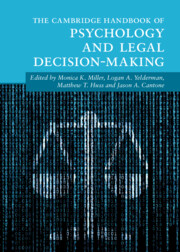Book contents
- The Cambridge Handbook of Psychology and Legal Decision-Making
- Cambridge Handbooks in Psychology
- The Cambridge Handbook of Psychology and Legal Decision-Making
- Copyright page
- Dedication
- Contents
- Figures
- Tables
- Editors
- Contributors
- Part I Introduction Chapters
- Part II Pretrial Phase Decision-Making
- Part III Trial Phase Decision-Making
- 20 Social Cognition of Jury Decision-Making
- 21 Beliefs About Juror Decision-Making and the Jury Process
- 22 Deciphering Directives
- 23 Decisions Surrounding the Use of Expert Testimony
- 24 Legal and Extralegal Factors that Affect Jurors’ Decisions
- 25 Decisions Regarding Insanity
- 26 Decision-Making in the Shadow of Evidence Law
- 27 Decision-Making in Contested Divorce Child Custody Cases
- Part IV Postconviction Phase Decisions
- Part V Other Legal Decision-Making
- Part VI Perspectives from the Field
- Part VII Conclusion
- Index
- References
26 - Decision-Making in the Shadow of Evidence Law
from Part III - Trial Phase Decision-Making
Published online by Cambridge University Press: 22 February 2024
- The Cambridge Handbook of Psychology and Legal Decision-Making
- Cambridge Handbooks in Psychology
- The Cambridge Handbook of Psychology and Legal Decision-Making
- Copyright page
- Dedication
- Contents
- Figures
- Tables
- Editors
- Contributors
- Part I Introduction Chapters
- Part II Pretrial Phase Decision-Making
- Part III Trial Phase Decision-Making
- 20 Social Cognition of Jury Decision-Making
- 21 Beliefs About Juror Decision-Making and the Jury Process
- 22 Deciphering Directives
- 23 Decisions Surrounding the Use of Expert Testimony
- 24 Legal and Extralegal Factors that Affect Jurors’ Decisions
- 25 Decisions Regarding Insanity
- 26 Decision-Making in the Shadow of Evidence Law
- 27 Decision-Making in Contested Divorce Child Custody Cases
- Part IV Postconviction Phase Decisions
- Part V Other Legal Decision-Making
- Part VI Perspectives from the Field
- Part VII Conclusion
- Index
- References
Summary
Evidence law controls what information will be admissible in court and when, how, and by whom it may be presented. It shapes not only the trial decisions of lawyers, judges, and juries, but also many other pretrial and trial decisions and behaviors – for example, by police (whether to initiate a search) and defendants (whether to take a plea deal). Even when the relevant evidence law is known, these decisions are made under great uncertainty. Parties often do not know whether key evidence will be admissible at trial, cannot know how jurors will react to evidence, and, particularly in the criminal context, may not know what evidence their adversary possesses. With all these applications and uncertainties, understanding how legal decisions are made depends on understanding both evidence law itself and the human reasoning processes that created and use it. This chapter thus describes the interplay of evidence law and decision-making across a variety of legal settings and, accordingly, makes frequent references to other chapters in this book.
- Type
- Chapter
- Information
- The Cambridge Handbook of Psychology and Legal Decision-Making , pp. 395 - 411Publisher: Cambridge University PressPrint publication year: 2024

